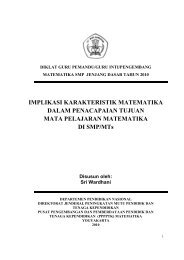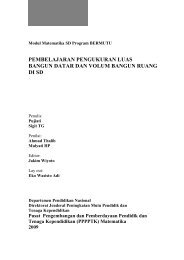25 Biggest Mistakes Teachers Make and How to Avoid Them
25 Biggest Mistakes Teachers Make and How to Avoid Them
25 Biggest Mistakes Teachers Make and How to Avoid Them
You also want an ePaper? Increase the reach of your titles
YUMPU automatically turns print PDFs into web optimized ePapers that Google loves.
Mistake 22: Unethical Behavior<br />
The students were scared <strong>to</strong> death, yet no one spoke. We stayed inside the classroom<br />
until the evacuation team came <strong>to</strong> inspect the room. They were shocked <strong>to</strong> find us still<br />
inside. About fifteen minutes had passed. We never saw our teacher again.<br />
The most difficult aspect of a<br />
crisis is the critical period of<br />
indecision that usually triggers the<br />
fight or flight response. The teacher<br />
in this scenario made the inappropriate<br />
choice of running away from the<br />
crisis <strong>and</strong> ab<strong>and</strong>oning her students.<br />
As a result, her students were not<br />
evacuated immediately. This teacher ’ s<br />
actions could have put her students’<br />
lives in jeopardy.<br />
Skilled teachers know that in a<br />
crisis situation, flight is not an<br />
option, especially when children are<br />
involved. The nature of the relationship<br />
of teachers <strong>and</strong> students places<br />
the teachers in loco parentis (in the<br />
position of the parent) as dictated<br />
by common law (Reutter, 1975). Competent<br />
professionals recognize the<br />
serious nature of their charge <strong>and</strong> act<br />
SCENARIO 22.8<br />
Sleepy Slacker<br />
173<br />
reasonably <strong>to</strong> protect the welfare<br />
<strong>and</strong> best interests of the children.<br />
Sometimes the call of duty dictates<br />
that teachers place their students’<br />
best interests before their own. In this<br />
scenario, the teacher had a responsibility<br />
<strong>to</strong> stay with the students <strong>and</strong><br />
make sure that they were evacuated<br />
safely. Parents have a right <strong>to</strong> assume<br />
that schools will do everything in<br />
their power <strong>to</strong> protect their children.<br />
Most teachers are good, dedicated<br />
people who would do whatever is<br />
necessary <strong>to</strong> protect their students. In<br />
the 1999 Little<strong>to</strong>n, Colorado, shooting<br />
crisis (Shore, 1999), a teacher sacrificed<br />
his life for his students. The<br />
teacher in this scenario was not prepared<br />
for this aspect of teaching—<br />
that’s probably why she was never<br />
seen again.<br />
I had a second-grade teacher that had a heart condition <strong>and</strong> required medication for it.<br />
This medication made her sleep through most of the class. She would have the students<br />
write <strong>to</strong> 100 over <strong>and</strong> over again while she slept. I missed out on so much learning that<br />
year, that for many years I was labeled “slow” or “poor” student. This resulted in my<br />
dislike <strong>and</strong> fear of school.<br />
In teacher’s college, my preservice<br />
classmates <strong>and</strong> I were<br />
warned that if we had any visible tics,<br />
twitches, defects, or other idiosyncratic<br />
behaviors that we might not be<br />
suitable material for teaching because<br />
we would distract our students. At<br />
the time, I thought that was a bit<br />
extreme, although in support of that<br />
notion, my entire class often focused,<br />
for much of the class period, on the tic<br />
that resided in the left eye of one of<br />
my English professors. My professor’s<br />
tic was distracting but very<br />
minor compared <strong>to</strong> what the students<br />
in this scenario experienced. The





